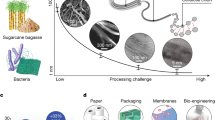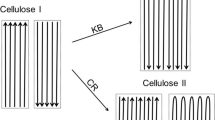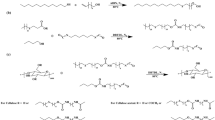Abstract
THE word ‘cellulose’ possesses two connotations : in a technical sense it denotes products obtained by certain processes from vegetable material ; in a chemical sensé it is commonly used for a linear high-molecular polysaccharide composed solely of glucose residues linked by α 1-4 glucosidic bonds. It is, however, not yet established with certainty that this polysaccharide is really the main constituent of natural cellulose fibres.
This is a preview of subscription content, access via your institution
Access options
Subscribe to this journal
Receive 51 print issues and online access
$199.00 per year
only $3.90 per issue
Buy this article
- Purchase on Springer Link
- Instant access to full article PDF
Prices may be subject to local taxes which are calculated during checkout
Similar content being viewed by others
References
Haworth, W. N., Chem. and Indust., 58, 917 (1939).
Pacsu, E., J. Polymer Sci., 2, 565 (1947).
Schmidt, E., Ber. dtsch. Chem. Ges., B, 67, 2037 (1934). Sookne, A. M. and Harris, M., J. Res. Nat. Bur. Stand., 25, 47 (1940). Neale, S. M., and Stringfellow, W. A., Trans. Farad. Soc., 33, 881 (1937).
van der Wyk, A. J. A., and Studer, M., Helv. Chim. Acta., 32, 1698 (1949) (Added in proof).
Author information
Authors and Affiliations
Rights and permissions
About this article
Cite this article
MEYER, K., STUDER, M. & VAN DER WYK, A. Constitution of ‘Pure’ Cellulose. Nature 164, 786–787 (1949). https://doi.org/10.1038/164786b0
Issue Date:
DOI: https://doi.org/10.1038/164786b0
Comments
By submitting a comment you agree to abide by our Terms and Community Guidelines. If you find something abusive or that does not comply with our terms or guidelines please flag it as inappropriate.



